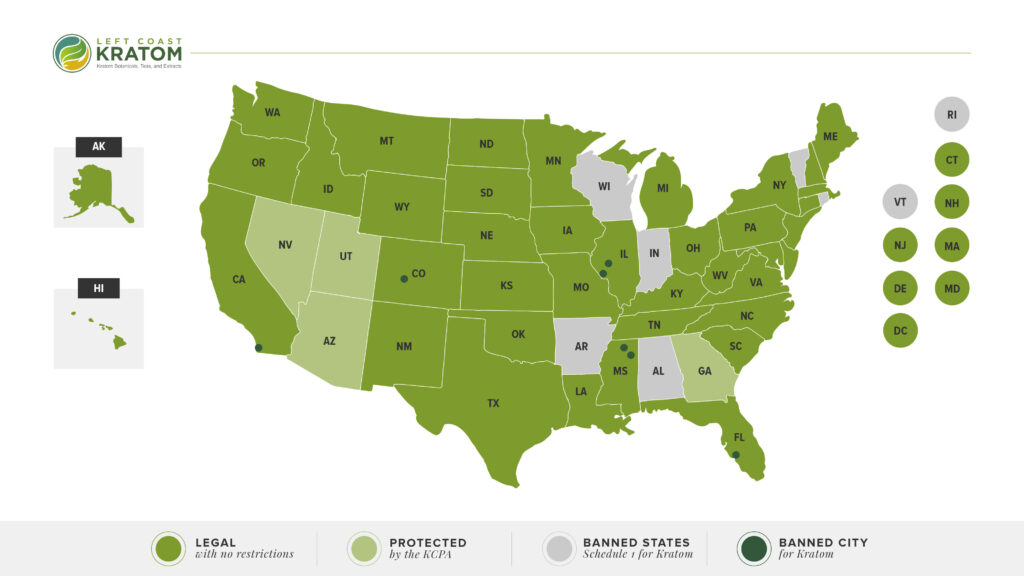Kratom is classified as a food in many parts of the United States. This classification puts limitations on what we as kratom vendors can and cannot say about our products. The FDA limits what is permitted, and we must follow those guidelines if we want to be able to continue to market and sell our products legally.
How exactly do these restrictions come into play, and why aren’t we fighting against them?
Let’s talk about kratom, kratom labeling, and how advocacy organizations are working to improve the misinformation surrounding kratom.
What Can And Cannot Be Said
Ultimately, the FDA has made it clear that they are willing and able to send cease-and-desist letters to any kratom vendor that is publishing what they deem to be unsubstantiated claims.
Even in the articles that we publish, we have to be careful about our language and how we talk about kratom.
In the past, companies selling kratom have made huge claims about what kratom can do, and the FDA pushed back against these. But it wasn’t only bold claims that the FDA warned about; simple, seemingly common knowledge statements have also attracted their attention.
Risky Statements
What type of statements do we have to be careful about when using on our site? There are many, and it is also difficult for us to follow these limitations. We want to be as open, clear, and helpful as possible for our customers, but FDA rules make this difficult at times.
These are just a few examples of statements that have got kratom vendors into trouble with the FDA in the past:
- Claiming that people use kratom as an alternative to some medications.
- Claiming that people prefer kratom over their other medication options.
- Claiming that people use kratom to help them stop using other things.
- Claiming that kratom has specific benefits.
We know that these examples are vague, and that is intentional as not to catch ourselves in this trap. As you can see from the breadth of those examples, however, it becomes difficult for honest vendors like ourselves to share any information or evidence with our customers without risking trouble.
What Are Unsubstantiated Claims?
Let’s talk a little more specifically about what the FDA considers “unsubstantiated claims,” which is the most common reason they send out warning letters. We’ve given a few vague examples above, but let’s look at direct news from the FDA to see how they frame their approach.
Specifically, a press report from the FDA states the following:
- Vendors are selling kratom “with deceptive medical claims for which there’s no reliable scientific proof to support their use.”
- Vendors “ take advantage of consumers by selling products with unsubstantiated claims that they can treat opioid addiction.”
If the FDA is truly against products that are not backed by science and willing to support kratom research, that would be an understandable position. However, the statement goes on to say that Kratom is an “opioid analog that may actually contribute to the opioid epidemic,” which may be an unsubstantiated claim by the FDA’s own rules.
Additionally, the FDA report states that the FDA is willing to look into how kratom may or may not relieve pain or opioid addiction symptoms if people believe that kratom’s active ingredients show that potential. However, the AKA states that FDA has refused to support that type of research for years.
Simultaneously, the National Institute on Drug Abuse has refused to support scheduling kratom as a drug because NIDA’s own research has not borne out that claim according to NIDA’s standards.
As you can see, it is a very confusing field for kratom vendors like ourselves to navigate. Our goal is always to provide safe, high-quality products to our customers. We want to support those products with information, but it isn’t always an easy thing to do.
The Standards We Follow
How do we handle the labeling and advertising of our products when faced with limitations and concerns about what we can and cannot say?
As members of the American Kratom Association’s GMP Compliance Program, we ensure that our labeling fits these things’ standards. AKA is up-to-date with the FDA’s latest requirements, and they are also at the forefront of helping to implement Kratom Consumer Protection Acts in states across the country.
In short, they know what they’re talking about when it comes to labeling, advertising, and more.
As of June 2020, the compliance program has laid out the following guidelines for vendors and marketing:
- Labels may not include:
- Any disease-related or unauthorized health claims
- Any reference to a “high”
- Any reference to clinical or research data
- Labels must:
- Be fully compliant with FDA claim rules
- Include a batch or lot number
- Affirm that mitragynine and 7-OH alkaloids haven’t been altered from their original allocation
- Advise consumers to talk to a physician about dosing
- Include a statement that pregnant women should not use kratom
- Include this exact statement: “This product is not intended to diagnose, treat, cure, or prevent any disease or condition.”
These same rules apply to the descriptions, websites, and advertisements used when marketing kratom products.
New: The Truth in Labeling Program
Recently, the American Kratom Association has started a reporting program known as the Truth in Labeling Program.
Due to the rise in vendors directly going against the guidelines expected by the FDA, the American Kratom Association and other advocates have seen a need for a program to keep track of and improve improper labeling practices.
Through this program, the AKA hopes to educate vendors that are putting the industry at risk through dishonest practices. If the vendors refuse to change their ways, the industry will start to self-regulate by reporting offenders to the FDA. To read more about how or why the Truth in Labeling Program is meant to work, you can check out AKA’s statement.


